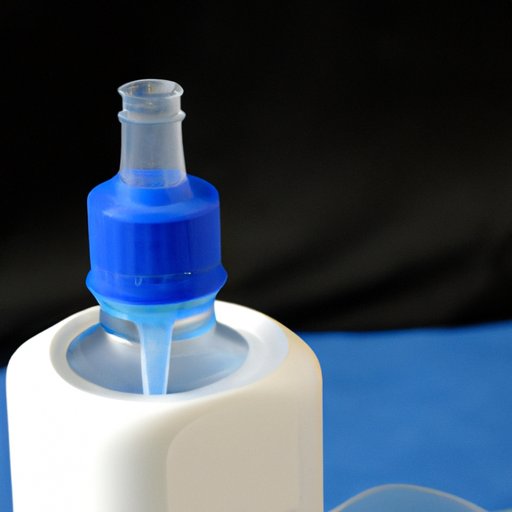Introduction
Acetone and mineral spirits are both solvents that are commonly used in a variety of applications. While they may seem similar, there are some key differences between them. In this article, we’ll explore the differences between acetone and mineral spirits and how to choose between them.

Exploring the Difference Between Acetone and Mineral Spirits
Acetone is a colorless, flammable liquid with a distinct odor and is classified as a ketone. It has a low boiling point and is highly volatile. Mineral spirits are a petroleum-derived solvent made from distilled petroleum. It is a clear, pale yellow liquid with a mild odor.
The two solvents have different chemical compositions. Acetone is composed of propanone and is the simplest and most common of the ketones. Mineral spirits are composed of aliphatic hydrocarbons and contain a mixture of paraffins and naphthenes.
In terms of their properties, acetone is much more volatile than mineral spirits. It evaporates quickly and has a low flashpoint, which means it can easily catch fire. Mineral spirits, on the other hand, have a higher flashpoint and evaporate more slowly. They are also less flammable than acetone.
The two solvents have different uses. Acetone is commonly used as an industrial solvent and a cleaning agent. It is also used in the production of plastics, textiles, adhesives, and paint thinners. Mineral spirits are primarily used as paint thinners and for removing grease and oil from surfaces. They are also used in the production of varnishes, lacquers, and other coatings.
A Comparison of Acetone and Mineral Spirits
When it comes to cleaning, acetone is more effective than mineral spirits. Acetone is able to dissolve many types of dirt and grease and is often used to clean tools and surfaces before painting. Mineral spirits, on the other hand, are less effective at cleaning and are better suited for removing grease and oil from surfaces.
When it comes to painting, mineral spirits are typically the better choice. They are less likely to damage the surface being painted and provide better coverage. Acetone is not recommended for use on painted surfaces as it can cause discoloration and damage.

How to Choose Between Acetone and Mineral Spirits
When choosing between acetone and mineral spirits, it’s important to consider the type of job you’re doing and the materials you’re working with. For example, if you’re cleaning a metal surface, acetone is the better option. If you’re painting a wooden surface, mineral spirits are the better choice.
It’s also important to consider the safety factors when working with either solvent. Both acetone and mineral spirits are flammable and should be used in well-ventilated areas. Protective gear such as gloves and goggles should also be worn when working with either solvent.
The Benefits of Using Acetone vs. Mineral Spirits
Acetone has several advantages over mineral spirits. It is more effective at cleaning and can dissolve a wider range of dirt and grease. It is also less flammable and evaporates more quickly. However, it is not recommended for use on painted surfaces.
Mineral spirits have their own advantages. They are less flammable than acetone and evaporate more slowly. They are also better suited for use on painted surfaces, providing better coverage and less risk of damage.

Alternatives to Acetone and Mineral Spirits
If you’re looking for an alternative to acetone or mineral spirits, there are several other solvents available. Denatured alcohol, turpentine, and xylene are all popular alternatives. However, these solvents come with their own set of safety considerations and should be used with caution.
If you’re looking for a natural cleaner, white vinegar is a great alternative. It is non-toxic and can be used to clean a variety of surfaces. Baking soda is another natural cleaner that can be used to remove dirt and grime from surfaces.
Safety Considerations for Working with Acetone and Mineral Spirits
When working with either solvent, it’s important to take safety precautions. Both acetone and mineral spirits are flammable and should be used in well-ventilated areas. Protective gear such as gloves and goggles should also be worn when working with either solvent.
It’s also important to properly dispose of any unused acetone or mineral spirits. Both solvents should be stored in sealed containers and disposed of according to local regulations.
Conclusion
Acetone and mineral spirits are two common solvents used in many household and industrial applications. While they may seem similar, there are some key differences between them. Acetone is a colorless, flammable liquid with a distinct odor, while mineral spirits are a petroleum-derived solvent made from distilled petroleum. The two solvents have different chemical compositions, properties, and uses. When deciding which one to use, it’s important to consider the type of job you’re doing and the materials you’re working with. It’s also important to take safety precautions when working with either solvent and properly dispose of any unused material.
(Note: Is this article not meeting your expectations? Do you have knowledge or insights to share? Unlock new opportunities and expand your reach by joining our authors team. Click Registration to join us and share your expertise with our readers.)
